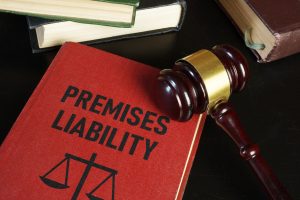Go to Page Section:
Premises liability law is a complex legal area that can impact a surprisingly broad range of situations.

Whether you’re a business owner welcoming customers through the door, a homeowner hosting a friendly gathering, or simply someone visiting a friend’s apartment, understanding premises liability law can help you avoid potential legal pitfalls and ensure everyone’s safety.
What Is Premises Liability Law?
Premises liability law defines the legal duty of care that property owners or occupiers owe to visitors who are injured on their property.
A duty of care means the property owner has a legal obligation to take reasonable steps to protect visitors from foreseeable harm.
The owner’s duty of care varies depending on the type of visitor and the reason they are on the property.
Who Is Considered a Visitor Under Premise Liability Law?
The classification of a visitor under premises liability law impacts the duty of care owed by the property owner.
Here’s a breakdown of the three main visitor categories:
Invitees
Invitees are individuals who are on the property with the owner’s permission for a commercial purpose.
This includes customers in a store, restaurant patrons, or even delivery personnel.
Property owners owe the highest duty of care to invitees.
This means they must take proactive steps to ensure the property is safe and address any potential hazards that could cause harm.
For instance, a grocery store owner must ensure there are no spills on the aisles that could cause a slip-and-fall accident.
Licensees
Licensees are individuals who are on the property with the owner’s permission for a non-commercial purpose.
Social guests invited to a home, attendees at a religious service, or children playing with permission in a neighbor’s yard are all considered licensees.
Property owners owe a general duty of care to licensees.
As such, they must warn them of known dangers on the property that are not readily apparent.
For example, if a homeowner has a broken step leading to the basement, they should warn their guests about it.
Trespassers
Trespassers are individuals who enter the property without permission.
Generally, property owners owe no duty of care to trespassers.
However, there are exceptions to this rule.
For example, property owners cannot intentionally injure trespassers or set hidden traps to harm them.
Additionally, there’s a concept of “attractive nuisance” which applies when a dangerous condition on the property attracts children, and the owner knew or should have known about the danger.
In such cases, the property owner may be held liable for injuries sustained by trespassing children.
Common Causes of Premises Liability Claims
Premises liability claims can arise from various situations where a visitor is injured due to unsafe conditions on the property.
Here are some of the most common causes:
Slip and Fall Accidents
Slip and fall accidents are one of the leading causes of premises liability claims.
Wet floors, uneven surfaces, poorly maintained walkways, or cluttered aisles in stores can all lead to slip and fall injuries.
Inadequate Security
Inadequate security measures in a building or parking lot can leave visitors vulnerable to assault or robbery.
Property owners may be held liable if their negligent security contributed to a crime.
Defective Conditions
Faulty stairs, malfunctioning elevators, broken equipment, or improperly secured furniture can all pose serious hazards to visitors.
Property owners have a responsibility to maintain their property in a reasonably safe condition and address any defective conditions promptly.
Negligent Maintenance
Examples of negligent maintenance include overflowing swimming pools, overgrown vegetation obscuring walkways, or inadequate lighting in stairwells.
These issues can create dangerous conditions and lead to accidents.
Establishing a Premises Liability Claim
If you are injured on someone else’s property, understanding the elements of a premises liability claim is crucial.
To succeed in a lawsuit, you will need to prove the following:
Duty of Care
You must demonstrate that the property owner owed you a duty of care based on your classification as an invitee, licensee, or trespasser (in limited situations).
Breach of Duty
You need to show that the property owner failed to uphold their duty of care.
For example, this could involve evidence of a dangerous condition on the property that the owner knew about or should have known about, and failed to take reasonable steps to address it.
Causation
It’s essential to establish that the property owner’s breach of duty directly caused your injury.
For instance, you need to show that the wet floor in a grocery store caused you to slip and fall and that the fall resulted in your broken arm.
Damages
In a premises liability claim, proving the extent of your damages is essential to recovering fair compensation for your injuries.
Such documentation serves as evidence of the financial, physical, and emotional impact the accident had on you.
Here’s a breakdown of the key areas to focus on:
Medical Expenses
Collect all medical bills associated with your injury, including ambulance rides, emergency room visits, doctor’s appointments, specialist consultations, physical therapy sessions, medications, and medical equipment needed.
Lost Wages
If your injuries prevent you from working, document your lost wages by obtaining copies of your pay stubs or a letter from your employer verifying your lost income.
Include potential future lost wages if your injuries have a long-term impact on your ability to work.
Reduced Earning Capacity
Even if you can return to work, your injuries might limit your earning potential.
Document any reduction in your earning capacity due to the accident, such as having to take a lower-paying job or working fewer hours.
Pain and Suffering
Pain and suffering encompass the physical and emotional distress caused by your injury.
This can be challenging to quantify, but medical records documenting your pain levels and psychological effects like anxiety or depression can strengthen your case.
Property Damage
If the accident damaged your personal property (e.g., clothing, glasses, phone), document the damage with photos and repair estimates or receipts for replacements.


Leave a Reply